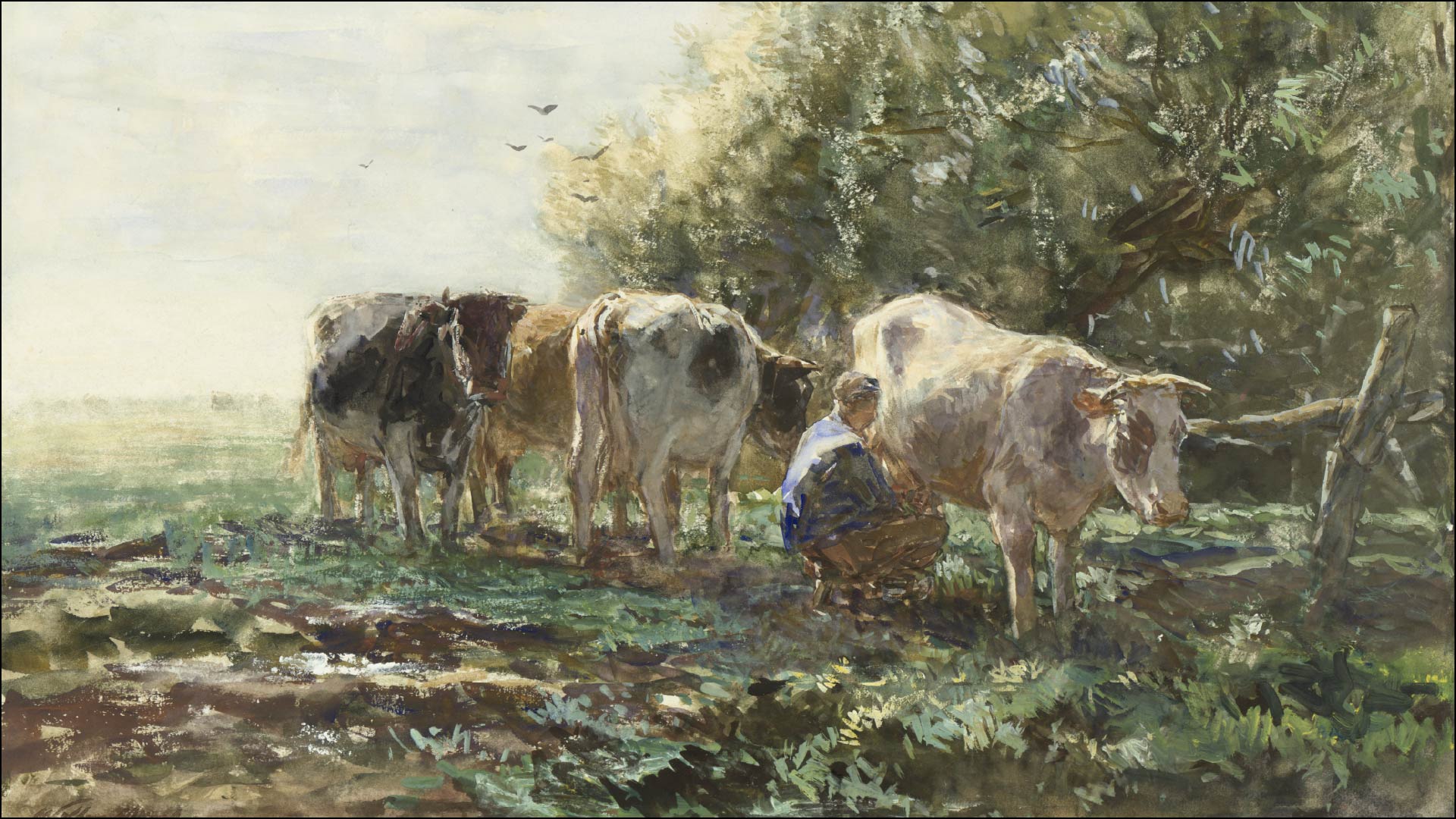Photo : The Milking Pen, Willem Maris, 1854 – 1910, cropped | Rijksmuseum
Brother Wilfried (Konrad) Wieser OSB
Missionary Benedictine
4 August 1934 – 29 December 2020
At the ripe old age of 86 and in the 63rd year of his monastic profession, unexpectedly however, Brother Wilfried Wieser died during a hospital stay that was supposed to be only a routine treatment for his diabetes. The versatile, gifted and interested farmer describes his origins in a few words: “I, Konrad Wieser, was born on 4 August 1934 in Palxöd, Aschau am Inn as the sixth of eight children of the Franz and Maria Wieser, née Utzschmied. I was raised in the Roman Catholic faith and attended the Aschau primary school from 1940 to 1948. Afterwards came two years in the agricultural school in Aschau. Until I entered the monastery on 18 March 1955, I worked on my parents’ farm. In May 1956 I received the monastic name of Brother Wilfried when admitted into the novitiate. On 20 May 1957 I made my temporary profession and in June 1960 made my perpetual vows. My professional training as a milker began on the Saturday of the anniversary of the dedication of the church in 1956 with Br. Kallistus Kling; the exam for assistant milker was in Kempten on 19 March 1959. I attended the agricultural school at St. Ottilien in the winter months of 1959–61. I took the master’s exam as a milker on 30 March 1964.”
The monastery candidate had already remarked in his application for admission, “I particularly enjoy cattle breeding” and something of his straightforward nature was already indicated when he observed of his parents’ cowshed: “It needs fixing.” In fact, the livestock at St. Ottilien and its constant renewal were to become the life’s task of Brother Wilfried. His milking work, which he had already begun in the novitiate, was to accompany him for nearly 60 years. He trained numerous apprentices in this profession, in which he had attained a high level of competence, from 1973 to 2010 with firm friendliness and without harshness. Although his daily work was strenuous due to the daily routine and physical demands and involved a few accidents, he was hardly ever sick, as he gratefully noted, “God gave me robust health.” Early on he familiarized himself with the computer for administration tasks and was one of the Internet pioneers in St. Ottilien. His informative notices on the bulletin board contributed to the fact that initial resistances to this medium disappeared. In general, Br. Wilfried was open to the constant changes that were taking place in the agricultural field. He described this in 2013: “In the 57 years I have been working in agriculture and livestock, a great change has taken place. In 1966 a pit run with a slatted floor, then a double-sided milking parlor and a circular conveyor.” In addition, there were many innovations for which he constantly had to keep training: new milking parlor, new forms of cattle care, replacing high silos with mobile ones, new forms of marketing especially for our own well-received cheese production. The biggest turning point was the construction of a new cow shed for 180 cows and a rotary milking parlor with 26 places. Brother Wilfried urged this project along with great energy since he saw it as a prerequisite for the survival of the operation; it concluded in 2010 with a solemn inauguration presided over by the then apostolic nuncio. That year, for the first time, there was a major breakdown in Brother Wilfried’s health when he was diagnosed with age-related rheumatism that for some time kept him away from milking.
His high level of professional competence and a calm, levelheaded sense of judgment led to Brother Wilfried’s being elected to the Eresing municipal council from 1972 to 1990. There he accompanied numerous projects of village renewal and expansion. The confreres also valued his expertise and his friendly, calm approach and elected him to the seniorate from 2003 to 2012. As an instructor in the farm, Brother Wilfried was involved with the alumni association, which benefited from his work as secretary with his skill in creating lists and administration work. His work in the stalls left little space for any outside experiences. At least he was able to complete a short assignment in 1987 on the farm of the Tanzanian Peramiho Abbey where worked in his area of specialization, cow insemination, and ten years later visited the mission territory of Ndanda. Concerning music, by 1957 he had joined the Brothers’ Brass Band where, shortly before his death, he was part of a musical performance playing his instrument, the flugelhorn. In addition, he played the alphorn, which you could hear especially during the May procession. His great passion was playing Shafkopf, which he did twice a week with his confreres for decades. Increasing difficulties in mobility forced a withdrawal from the activities of work. You could frequently see him as he drove around the land with an electric scooter inspecting fields and meadows. With the scooter he regularly fetched milk for the infirmary from the farm shop and at the same time enjoyed the social interaction there.
In his application for admission in 1954, Brother Wilfried had remarked as a young candidate for the monastery, “I am firmly convinced that God has called me. I want to give him the rest of my life as a brother.” He fulfilled his promise simply and credibly. Now may he rest in peace!
— Archabbot Wolfgang Öxler and the Community of Sankt Ottilien

